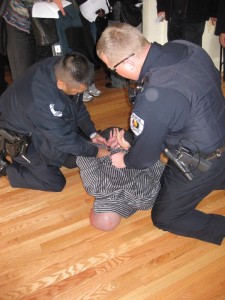
Gregory Koger faces months in Cook County jail for “unauthorized use of an iPhone.” He attempted to videotape a peaceful statement by Sunsara Taylor opposing the censorship of her talk prior to a public event at the Ethical Humanist Society of Chicago (EHSC) on Nov. 1, 2009. But he was grabbed by several police, dragged out of the room, maced and charged with three misdemeanors, all classified as non-violent. After a controversial trial, Koger was found guilty and sentenced to 300 days in jail. Now the Illinois Supreme Court has refused to hear his appeal and his supporters are circulating a petition opposing what they say is a wrongful conviction.
Art mimics life:
In a recent episode of “The Good Wife,” called I Fought The Law, Alicia is returning from a college visit downstate with her two teenagers. The son, Zach who is driving, is pulled over by a cop who wants to search his car for drugs. Zach brings up this key real-life issue by secretly recording his conversation with the police officer. The episode touches on Illinois’ notorious eavesdropping law, though Zach gets off without addressing the eavesdropping statute head-0n.
The group that came together to oppose Koger’s prosecution includes former members of the EHSC and others. They argue that his extraordinary sentence of 300 days for a “non-crime” was meted out because of Koger’s early juvenile convictions, another dangerous precedent. Koger spent over a decade in prison (including six years in solitary confinement) for crimes committed as a juvenile. While in prison, he read extensively, earned his paralegal certificate, and became dedicated to working for social justice after his release several years ago. According to his defense committee, “Former prisoners who step forward to become part of challenging injustices of this society and inspire others to do the same cannot be allowed to face political repression.”
How could videotaping be equated with trespass? The prosecutor argued that the act of videotaping (or eating a sandwich, for that matter) is the same as trespass. “Even if … defendant’s eating a sandwich – ‘Sir, you can’t eat your sandwich in here; if you do it again, you’re going to be asked to leave.’ The moment he takes that sandwich back out, he becomes a trespasser.” That is a direct quote from the prosecutor’s closing argument. The judge overruled repeated defense objections to this misstatement of the law, which requires that notice of trespass be given and time allowed to leave.
Dr. Lisa Barr, journalist, lawyer, and media educator, wrote, “This is not just an Illinois issue. At a time when the funding mechanism for newspapers across the country is failing and newspapers are folding, we need freelance journalists more than ever to tell the stories that keep our communities whole in a democratic sense. Supporting Gregory Koger is supporting any journalist in any community.” Koger’s supporters see his prosecution as part of worldwide attempts to curtail the ability of dissenters and protesters to document their actions and police repression. “[F]rom Tunisia to Wall Street, political attacks on those who document these courageous acts are escalating,” their new statement maintains.
The Illinois Supreme Court has now refused to hear Koger’s final appeal. What does this mean? It means that the lower court’s dangerous interpretation of the Illinois trespass statute is affirmed and is now a threat to everyone who records protests and the actions of the police. It means that the court’s vindictive sentence of 300 days is affirmed, punishing a former prisoner for standing up to injustice and oppression. And by moving immediately to revoke Gregory’s bond, the State is continuing its ruthless persecution.
Koger’s supporters are now gathering signatures on a petition declaring their opposition to this move, which will be presented to Cook County officials. They also plan to be in court whenever Koger is ordered to appear. They want the county authorities to know that support continues to grow for Koger. Thousands have signed previous statements on Koger’s behalf, including national figures like Cindy Sheehan, PZ Myers, Cynthia McKinney, and Bill Ayers.
M. Ross Adams, a member of Koger’s defense committee, commented, “I resigned from the Ethical Humanist Society of Chicago because of their unethical and inhumane behavior in this case. I had been a member for almost 10 years.” The defense group argues that the newly available police report and the video taken by Koger before his arrest now available at their website put the lie to testimony given by key prosecution witnesses from the Ethical Humanist Society of Chicago.












Be First to Comment